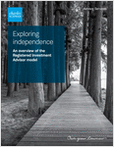What You Need to Know
- Get the whole family on board.
- Put caregiving and estate planning on the map.
- Show that planning is part of the path of caring.
Financial professionals hold a unique position of trust and responsibility in the lives of their clients and their families.
Beyond managing investments and wealth accumulation, they are often called upon to guide individuals and families through some of life’s most challenging and unexpected events.
When times get tough, your clients may naturally turn to you for guidance to help them navigate important financial events.
Are you prepared?
The key to helping clients and their families is laying out your strategy ahead of time.
Nobody wants to focus on a future crisis, but by planning early, you’ll build an even stronger relationship with your clients and the rest of their family.
Orient clients with family meetings.
I have heard too many stories of families being torn apart due to confusion and arguments after the death of a loved one.
You can aim to avoid this scenario by serving as the host for multi-generational family meetings.
During these meetings, encourage the loved one to communicate their wishes prior to their death.
This is an effective way to help family members understand in advance how things will work if (and when) a life event occurs.
Having open lines of communication can help your clients confidently navigate the dynamics of sharing their plans for the future with family members.
At the same time, it can further cement your reputation as a calm voice of reason during challenging family situations.
Show that the place where people need estate plans is here.
Some clients may think that estate planning is for the rich and famous.
But, does it seem like almost every family has a family estate horror story? Many of your clients would likely benefit from developing a comprehensive estate strategy the two of you continue to revisit as time goes by.
Proactively helping families navigate estate plans can help your clients’ children understand who to call when a loved one passes away, because they’ll already trust you to handle important financial matters during emotional times.
Point an arrow at the caregivers.
Taking care of a loved one brings many responsibilities and stress.
People often think caring for a family member means driving them to appointments, making sure they are taking medicines as prescribed, or helping them with daily tasks.
However, the role of caregiver is so much more.
The caregiver is often on the front lines when it comes to organizing documents, making difficult decisions, and playing negotiator with other family members.
Too often, caregivers feel the guilt, pressure, or fear of “not doing enough.” Not only that, many caregivers often find themselves sandwiched between caring for a loved one’s needs and the demands of their own family.












 Kylie Murray is the director of practice management at
Kylie Murray is the director of practice management at  Copyright © 2024 ALM Global, LLC. All Rights Reserved.
Copyright © 2024 ALM Global, LLC. All Rights Reserved.